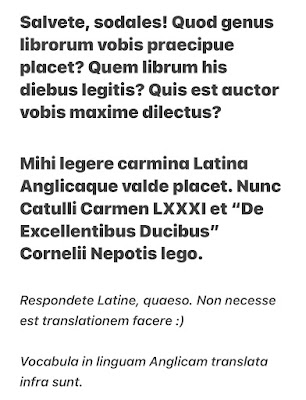Referring to:
https://www.facebook.com/.../permalink/521706370440636/
Learning a language isn’t only of course about what you know
already – but also about what you can find out so that you can develop your
knowledge.
Quod genus librōrum vōbīs praecipuē placet? │ What type of
books do you particularly like?
genus, generis [3/n]: type
Let’s take it apart to find out [1] what it literally says
and [2] how you can rework it.
[1]
[i] Quod genus … [ii] vōbis … [iii] placet?
[i] What type … [ii] to you …. [iii] is pleasing? = What
type do you like?
The three-part question:
[i] Quid [ii] tibi (one person) / vōbīs (more than one
person) [iii] placet? = literally: [i] What [ii] to you [iii] is pleasing? =
What do you like?
The three-part answer:
[i] X [ii] mihi [iii] placet = literally: [i] X [ii] to me
[iii] is pleasing = I like X
Rather than literally saying “I like (something)” Latin
changes the idea around to “Something is pleasing to me”. This is no different
from Fr. X me plaît, or Gmn. X mir gefällt, or Russ. X mne nravitsya i.e. they
are all saying X is pleasing to me. English can do that but it sounds rather
formal.
[2]
[a] Therefore, whatever you like in Latin can be expressed
in this way.
[i] Mūsica [ii] mihi [iii] placet │ I like music =
literally: music is pleasing to me
Hic liber mihi placet │ I like this book = literally: this
book is pleasing to me
Haec pictūra mihi placet │ I like this painting
Hoc carmen mihi (valdē / praecipuē) placet │ I (really /
particularly) like this song / poem
Hoc carmen mihi perplacet │ I really like this
song / poem; per- intensifies the verb
Ea (lēx) mihi perplacet (Cicero) │ This / that
(law) really pleases me = I really like this law
Latin is flexible and so you can find the words in a
different order:
servī meī perplacet mihi cōnsilium (Plautus) │ The advice /
plan of my slave is very pleasing to me = I very much like my slave’s advice
[b] If what you like is plural then the verb will become
plural:
[i] Carmina [ii] mihi [iii] placent │ I like
poems = literally: poems are pleasing to me
Monumenta antiqua mihi placent │ I like ancient monuments
Commentāriī dē bellō Gallicō mihi placent │ I like the
Commentaries on the Gallic War
Fābulae mihi placent │ I like stories / plays
Cōmoediae ¦ Plautī ¦ mihi placent │ I like the
comedies ¦ of Plautus
Carmina ¦ Catullī ¦ mihi placent │ I like the
poems ¦ of Catullus
Antīqua opera et verba cum vōbīs placent … (Plautus) │ Since
ancient works and words are pleasing to you …
[c] What you like does not have to be a noun; it can be an
infinitive:
[i] Legere [ii] mihi [iii] placet │ I like
reading / to read = literally: to read is pleasing to me
Mihi legere carmina Latīna … placet │ I
like to read Latin poems = literally: to me it’s pleasing to read Latin
poems
Saltāre mihi placet │ I like to dance
Cantāre / canere mihi placet │
I like to sing
Mihi legere fabulās placet │ I like reading
/ to read stories
Mihi epistulās scrībere placet │ I
like writing / to write letters
Mihi mūsicam audīre placet │ I like listening
to / to listen to music
Mihi pictūrās pingere placet │ I like to
paint pictures
Mihi pelliculās / taeniolās spectāre placet
│ I like to watch movies; pellicula, -ae [1/f]; taeniola, -ae
[1/f] (New Latin)
Mihi versūs ediscere placet │ I like to
learn verses by heart
Mihi cōmoediās ¦ Plautī ¦ legere praecipuē placet. │ I
especially like reading the plays of Plautus.
Ōrātiōnēs / Epistulās ¦ Cicerōnis ¦ legere mihi valdē
placet. │ I really like reading Cicero’s speeches / letters.
litterae, -ārum [1/f/pl] can refer to [i] one or more
letters, or [2] literature i.e. the concept is usually expressed in the plural
Litterās Latīnās legere mihi valdē placet. │ I really like
reading Latin literature.

No comments:
Post a Comment